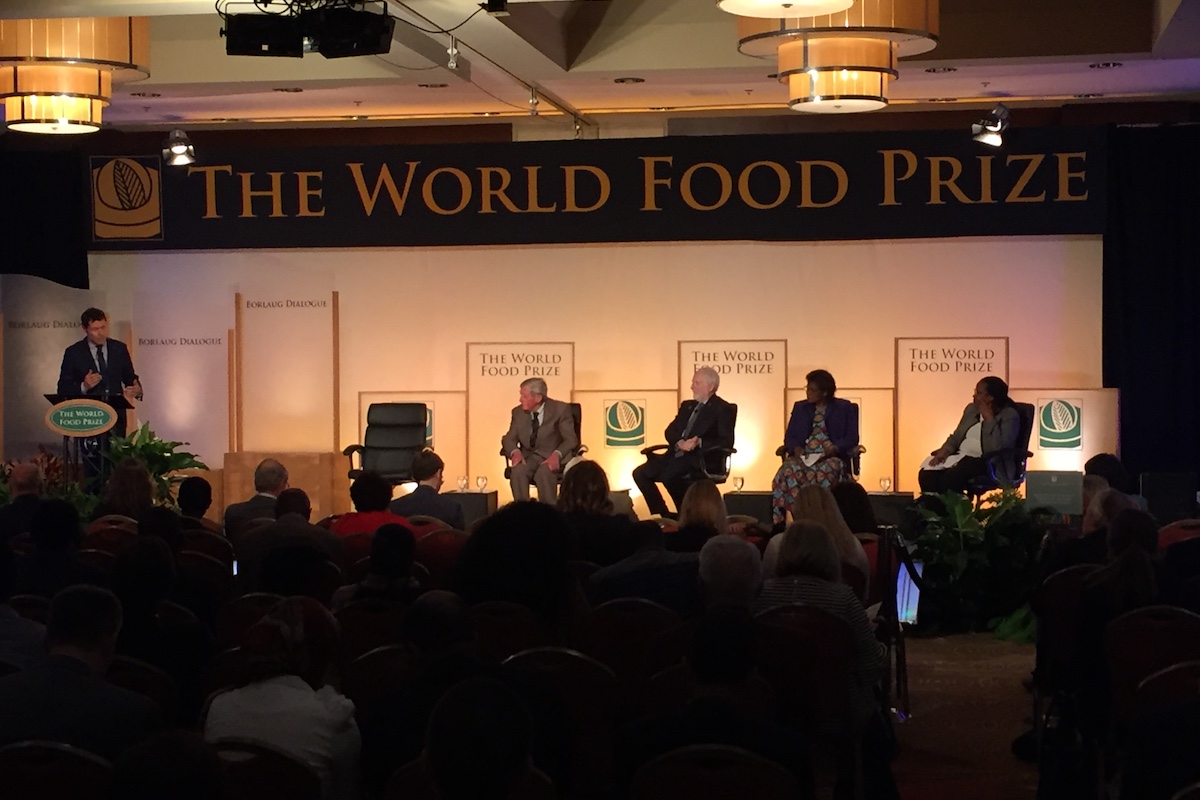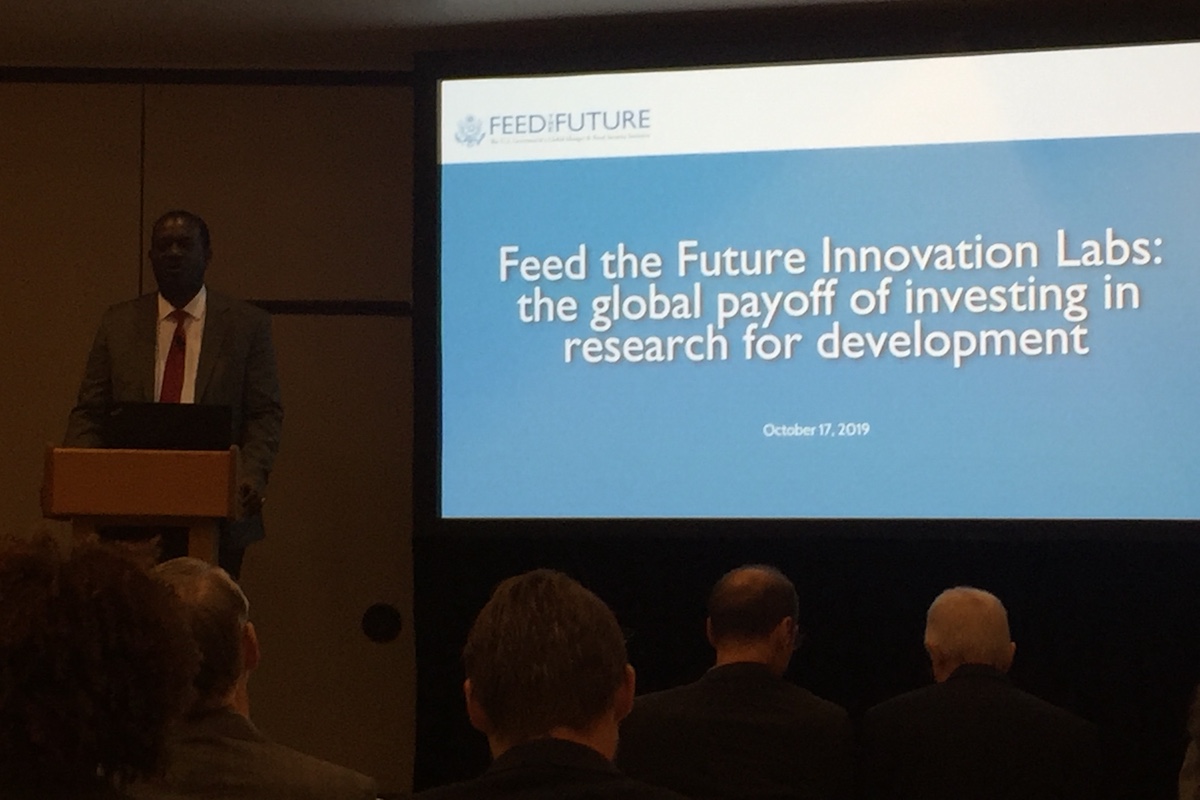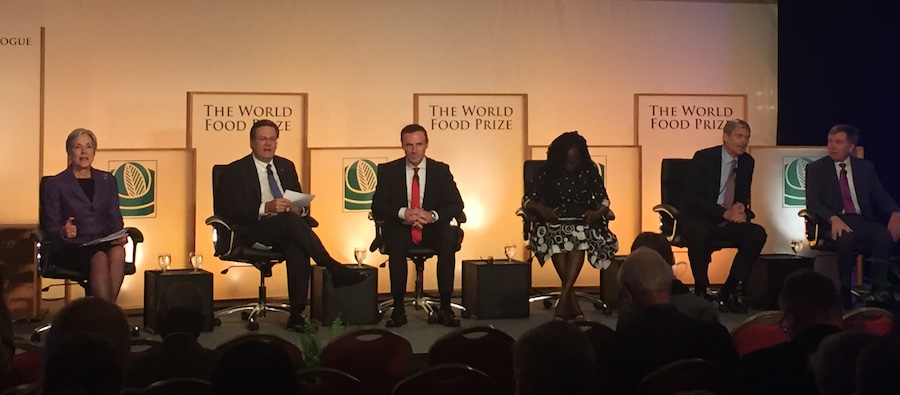The 2019 Borlaug Dialogue concluded today with three final panels exploring the importance of building resilience against climate change and conflict – neatly wrapping up the main topics of conversation that have appeared over the last three days.
Two major issues that cropped up time and again were climate change and the projected global population growth. With these looming challenges, many speakers highlighted the need for the agricultural world to not only prioritise increases in productivity, but also nutrition, livelihoods and the environment. This will be driven not only by technological advances but also through wider adoption of existing solutions.
In his last year as President of the World Food Prize, Ambassador Ken Quinn posed a resounding question before the Dialogue commenced: “Can we sustainably and nutritiously feed the 9-10 billion people who are going to be on our planet in the next 25-30 years?” The subsequent sessions endeavoured to find answers to this essential question.
Here are five key takeaways from this year’s Borlaug Dialogue in answer to this question:
Breed more diverse and resilient crops that people want to grow, buy and eat.
In an increasingly climate-stressed environment, growing a wide variety of resilient crops is one way farmers can minimise the risk of loss and improve chances of higher yields and better incomes.
Yet while increasing yields is evidently important to feed more people, Purvi Mehta of the Gates Foundation argued that alone “more production, or a lot of food, does not translate into better nutrition”. Emphasising the vital role that diversification can play in leveraging agriculture’s role in food security, Dr. Mehta attested that it helps to make food more affordable, provide more health-essential nutrients and mitigate climate change.
But Simon Groot, East-West Seed founder and 2019 World Food Prize Laureate, commented on the difficulties he has encountered in getting farmers to spend money on new seeds for resilient crops. Offering a solution to this issue, Stuart Morris – also of East-West Seed – stated that “seeing is believing” and that to improve uptake of production practices that are resilience-building, profitable and sustainable, peer-led demonstrations are key.

CGIAR’s ‘Crops to End Hunger’ panel on Day One of the Borlaug Dialogue.
Empower and train more local people, especially farmers themselves.
Mr. Groot’s main call to action throughout the Dialogue was that working closely with farmers was essential. He argued that resilience-building solutions need to be country-specific and culture-specific, and that globalised approaches need to be tailored accordingly. Local teams who know the land themselves are needed, according to Mr. Groot, but they must also be fully trained in this type of agricultural development work.
Syngenta’s Erik Fyrwald agreed with this sentiment. He set out four essential steps for farmers to reduce their impact on climate change: increase yields, reduce waste, use less land and reforest. But in order to for farmers to do this, he argued, training is imperative.
Financial barriers to climate-smart farming also need to be removed, according to David Festa of the Environmental Defense Fund. Dina Esposito of Mercy Corps and Ertharin Cousin, former director of the UN’s World Food Program, similarly argued that improving access to finance for people in developing countries is essential, so they can support themselves and build resilience rather than having to rely on aid relief.
Ms. Esposito wryly enacted an aid recipient’s gratitude: “Thank you for the food, but what I really want are education, training, access to finance, so I can get on with my life.”
Improve how AgTech is approved, accepted and adopted – not just how it is created.
When it comes to agricultural development, new innovation alone is not enough – training, knowledge transfer and improving access to new technologies is essential. Highlighting the frustrating access barriers many farmers face when it comes to AgTech, Erik Fyrwald cited the recent proliferation of Fall Armyworm as an example. He claimed that we already have the technology to deal with this “devastating pest” but that its use is prohibited due regulatory issues.
Jan Low of the International Potato Centre raised the issue of affordability – specifically in the context of sub-Saharan Africa – arguing that although a wide variety of digital technologies are available, some are dependent on smartphones, which many farmers cannot afford.
And using Uganda as an example, Josephine Okot – founder of Victoria Seeds – explored the dual challenge posed by the country’s gender gap and air of distrust regarding new technology. She called it a “disgrace to humanity” that women in Uganda are still mainly farming using hand tools rather than mechanisation, and said that there was distrust in technological solutions that could only be overcome by government deployment.

Dr. Adegbola “Gbola” Adesogan (Director, Livestock Systems Innovation Lab and Chair Council of Innovation Lab Directors at the University of Florida) leads a session on the US Government’s ‘Feed the Future’ initiative.
Communicate scientific evidence better to advocate for popular support.
A main topic of discussion was that although vast amounts of evidence exist that show viable paths to achieving Zero Hunger and mitigating climate change, this information is not being communicated in the right way to the right people.
Chris Nelson of Kemin Industries put forward the argument that youth must be engaged with scientific perspectives early, and that you do not need to be a trained scientist to have a factual, evidence-based view on issues like climate change.
And countering domestic opposition to foreign development funding in the US, Gebisa Ejeta of BIFAD and Tim Dalton of Feed the Future presented statistical evidence that there are “spill-over benefits” for countries providing funds. Professor Ejeta cited a 2018 study, which estimated that the international community saves $16 in crisis response for every $1 spent on conflict-prevention measures, while Mr. Dalton stated that from $1.32 billion foreign investment in development and aid programmes, the US saw returns of $4.7 billion.
Develop trust and accountability with communities in conflict-affected and fragile states.
Better communication is not only a necessity to rally the support of stakeholders, funders and tax-payers; it is an essential component in agricultural development work on the ground, particularly within vulnerable or conflict-affected communities.
Susanna Campbell of the American University argued that creating informal local accountability was key to gaining the trust of local people. Professor Ejeta shared this viewpoint, stating that you “cannot rush trust”. He emphasised the importance of building relationships in developing countries before global crises occur, to grow resilience.

2019 World Food Prize Laureate Simon Groot is honoured at the Laureate Award Ceremony on Day Two of the Dialogue.
Interested in more content from Farming First? Sign up to our newsletter by entering your email at the top of our homepage. Follow @FarmingFirst on Twitter and on LinkedIn.



